The Intel Core i7-7700K (91W) Review: The New Out-of-the-box Performance Champion
by Ian Cutress on January 3, 2017 12:02 PM ESTProfessional Performance: Windows
Agisoft Photoscan – 2D to 3D Image Manipulation: link
Agisoft Photoscan creates 3D models from 2D images, a process which is very computationally expensive. The algorithm is split into four distinct phases, and different phases of the model reconstruction require either fast memory, fast IPC, more cores, or even OpenCL compute devices to hand. Agisoft supplied us with a special version of the software to script the process, where we take 50 images of a stately home and convert it into a medium quality model. This benchmark typically takes around 15-20 minutes on a high end PC on the CPU alone, with GPUs reducing the time.
Here we report the overall time to complete the test – sub-test results can be found in Bench.
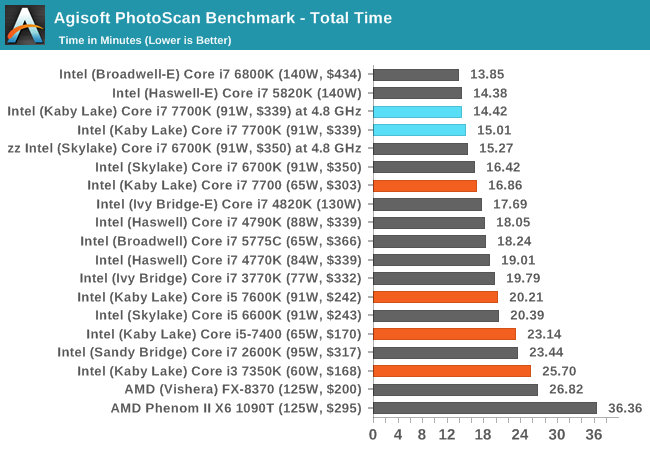
Here’s another instance where a stock Core i7-7700K can overcome an overclocked Devil’s Canyon. Agisoft spends a good time of its workload using cache heavy threads, showing that large core parts do really well, however the i7-7700K is on par with the six-core Core i7-3960X, showing that extra IPC and frequency can make up for a core or two.
Cinebench R15
Cinebench is a benchmark based around Cinema 4D, and is fairly well known among enthusiasts for stressing the CPU for a provided workload. Results are given as a score, where higher is better.
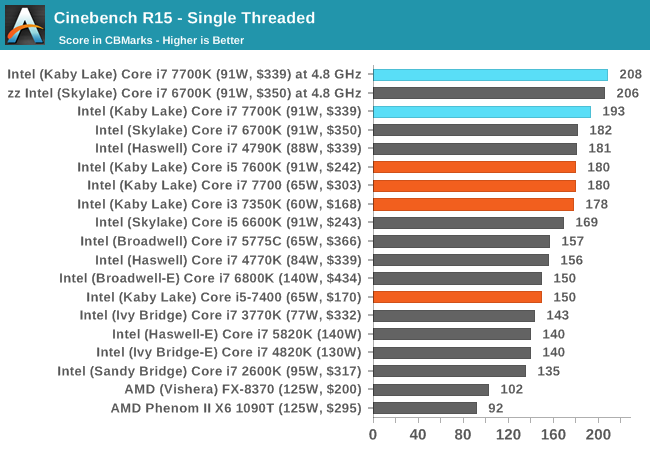
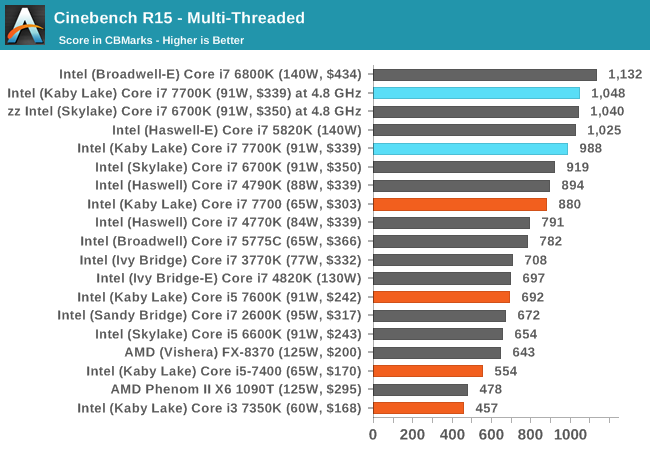
While Cinebench R15 is more a synthetic, it remains a popular test to measure professional performance and is free to use. For single threaded performance, the Core i7-7700K hits the top of the pile. With the Skylake and Kaby Lake parts both at 4.8 GHz, there’s almost nothing between them, showing the identical IPC. In multithreaded mode the 7700K is on top of all the mainstream processors as expected, and when overclocked can mix it up with some of the extreme processors as well.
HandBrake v0.9.9: link
For HandBrake, we take two videos (a 2h20 640x266 DVD rip and a 10min double UHD 3840x4320 animation short) and convert them to x264 format in an MP4 container. Results are given in terms of the frames per second processed, and HandBrake uses as many threads as possible.
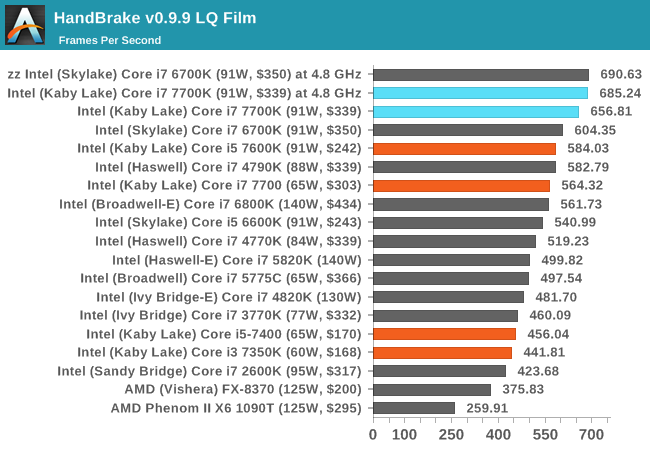
The LQ video emphasizes IPC due to its low cache overhead, meaning that the i7-7700K wins again, and when overclocked, performs the same as the 6700K at the same frequency.
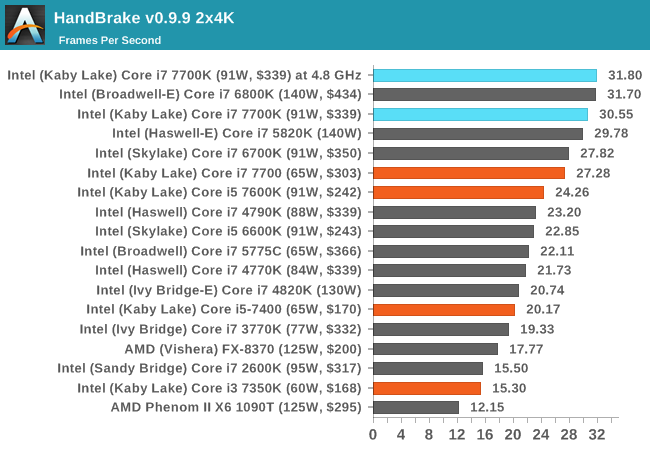
The higher resolution video however means that cores with frequency dominate. The i7-7700K stands above processors such as the i7-5820K, the i7-4930K and the i7-3960X, which is no small feat. But if you really want performance here, the big boys are still top performers (if you can afford them).
Hybrid x265
Hybrid is a new benchmark, where we take a 4K 1500 frame video and convert it into an x265 format without audio. Results are given in frames per second.
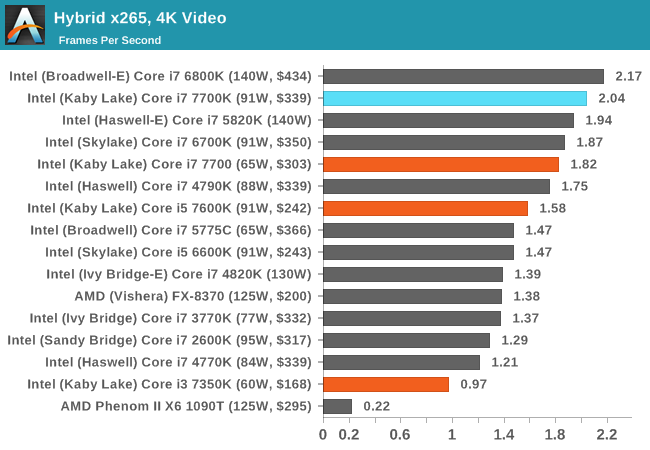
Our Hybrid test is somewhat similar to the HandBrake HQ test, showing the i7-7700K sitting tall as the mainstream champion.










125 Comments
View All Comments
RichUK - Tuesday, January 3, 2017 - link
Very thorough review, thank you!Shame you didn't get a better sample.
Will you look to do a focused review around delidding and the associated overlooking benefits?
RichUK - Tuesday, January 3, 2017 - link
That's should read 'overclocking' - Damn auto correct on my phone!close - Wednesday, January 4, 2017 - link
Yeah... great review that calls a CPU that's basically identical to the previous generation as "The New Out-of-the-box Performance Champion". While mathematically it can be considered true I think such a title is grossly misleading.Intel brought almost 0 improvements over generations but didn't bother dropping the price accordingly. This isn't "the new champion", this is last year's CPU a little overclocked. The fact that it comes "pre-overclocked" doesn't make it a champion nor does it make the title and conclusion of this article any more valuable.
We'll see how Zen does but if it offers similar performance to Intel's offerings for substantially less money a lot of journalists will have to backtrack on their "Intel's having a hard time advancing performance because there's no more headroom and prices can't go down due to research and fabrication costs".
close - Wednesday, January 4, 2017 - link
Also this: http://arstechnica.com/gadgets/2017/01/intel-core-...Arstechnica's conclusions:
"With identical performance to Skylake, Intel brings desktop performance to a standstill."
"the Kaby Lake desktop chips are but a mere clock speed boost disguised under the nomenclature of a new CPU generation. From an IPC standpoint, there's nothing to tell Kaby Lake apart from Skylake"
AnandTech's conclusions:
"The New Champion"
"The Core i7-7700K sits at the top of the stack, and performs like it."
"handily mops the floor with the Devil’s Canyon part [nb, 3 year old part!], resigning it to history."
Intel are selling yesterday's soup, reheated but at the same price and Ian is trying hard to make everyone think that soup is like wine, it gets better with age. The truth is that there's basically no reason whatsoever to upgrade this year since we're still talking about a 6700K with 200MHz. *ANY* user buying a K part should be able to achieve that with last year's CPUs.
close - Wednesday, January 4, 2017 - link
P.S. Devil's Canyon is actually a 4 year old part that was overclocked and relaunched 3 years ago. So it's "refreshing" to see how AnandTech gets excited about a brand new CPU that manages to be ~10% faster than a 4 year old CPU with slightly lower (boost) clocks in office/workstation scenarios and which brings 0 benefits in gaming scenarios. That would be a ~5% average improvement for a user.Wow Ian, it really doesn't take much to get you all hyped up these days, does it?
Lolimaster - Wednesday, January 4, 2017 - link
Anandtech was a shill site for a long time, Kaby Lake was going to prove whose site is that. Doubts answered.pogostick - Wednesday, January 4, 2017 - link
The best line is the first line: "The Intel Core i7-7700K is what happens when a chip company stops trying."slickr - Wednesday, January 4, 2017 - link
Yeah, very suspicious of Ian. Is he getting paid to shill for Intel or is he that BAD at journalism!?fanofanand - Thursday, January 26, 2017 - link
As someone who has read Ian's work for years, he is no shill. I disagree with his politics, but he is a good, honest journalist. Was he overly generous in this piece? No doubt. Calling it a great overclocked then saying it only boosts 300 MHz was a giveaway there. I am quite certain purch wanted this to go out as a softer piece for the $$$$, so Ian disguised his contempt the best he could. Look for the clues, they are there. Only reason to go Kaby is if you really want an optane cache. He kind of made that clear I thought.RichUK - Thursday, January 5, 2017 - link
I skipped to the overclocking section and didn't read the rest. ;) That's all I'm interested in.